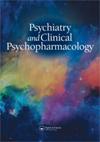Social cognition and emotion regulation may be impaired in adolescents with obesity independent of the presence of binge eating disorder: a two-center study
IF 0.5
4区 医学
Q4 PHARMACOLOGY & PHARMACY
引用次数: 6
Abstract
ABSTRACT Background: Binge eating disorder (BED) and obesity in adolescents is associated with variations in social cognition and emotion regulation. The current study aimed to evaluate the Theory of Mind (ToM) abilities in adolescents with obesity with and without BED and to examine how they related to emotional and psychopathologic evaluations. Methods: One hundred twenty-eight adolescents comprising 32 non-BED adolescents with obesity, 32 adolescents with BED and obesity, and 64 healthy controls (HC) completed a battery of tests to analyze their social cognition and clinical psychopathologic profile. Results: Patients with BED and non-BED patients with obesity showed poorer performance in emotional regulation and social cognition tasks compared with normal-weight adolescents without BED. Various correlations were evident between depression, emotional regulation problems, and eating attitudes and patterns. Conclusions: Patients with BED and non-BED adolescents with obesity showed a decline in ToM tasks, independent of their clinical psychopathological profile. Consistent with other studies, this is the first study to assess both social cognition and emotion regulation skills in adolescents with BED and obesity.社会认知和情绪调节可能在青少年肥胖独立暴食障碍的存在受损:一项双中心研究
背景:青少年暴食症(BED)和肥胖与社会认知和情绪调节的变化有关。本研究旨在评估青少年肥胖者的心理理论(ToM)能力,并研究其与情绪和精神病理评估的关系。方法:128名青少年,包括32名非BED型青少年合并肥胖、32名BED型青少年合并肥胖和64名健康对照(HC),对他们的社会认知和临床精神病理特征进行了分析。结果:与体重正常的非BED青少年相比,BED患者和非BED肥胖患者在情绪调节和社会认知任务中的表现较差。抑郁症、情绪调节问题和饮食态度和模式之间的各种相关性都很明显。结论:患有BED和非BED的青少年肥胖患者在ToM任务中表现出下降,与他们的临床精神病理特征无关。与其他研究一致,这是第一个评估患有BED和肥胖的青少年的社会认知和情绪调节技能的研究。
本文章由计算机程序翻译,如有差异,请以英文原文为准。
求助全文
约1分钟内获得全文
求助全文
来源期刊

Psychiatry and Clinical Psychopharmacology
Medicine-Psychiatry and Mental Health
CiteScore
1.00
自引率
14.30%
发文量
0
期刊介绍:
Psychiatry and Clinical Psychopharmacology aims to reach a national and international audience and will accept submissions from authors worldwide. It gives high priority to original studies of interest to clinicians and scientists in applied and basic neurosciences and related disciplines. Psychiatry and Clinical Psychopharmacology publishes high quality research targeted to specialists, residents and scientists in psychiatry, psychology, neurology, pharmacology, molecular biology, genetics, physiology, neurochemistry, and related sciences.
 求助内容:
求助内容: 应助结果提醒方式:
应助结果提醒方式:


